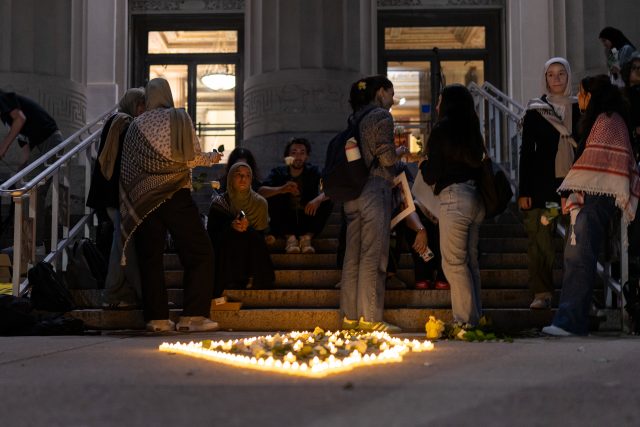[ad_1]
About 50 University of Michigan students and community members gathered on the steps of Angell Hall Thursday evening for a vigil in honor of the thousands of Palestinians who have died during the 11-month-long Israeli military campaign in Gaza. The vigil was organized by the TAHRIR Coalition, a coalition of more than 90 pro-Palestine organizations.
The vigil comes after Gaza’s health ministry released a 649-page document listing names of and other identifying information about 34,344 Palestinians killed in Gaza since Oct. 7.
At about 9:20 p.m., several speakers addressed the crowd from the top of the Angell Hall stairs. Attendees held Palestinian flags and posters with photos of victims from Gaza while gathering around an outline of Palestine at the base of the steps.
Engineering senior Maryam Shafie spoke to attendees about the ongoing toll of the conflict, emphasizing the grief experienced by those in Gaza.
“We must remind ourselves that death is not a rare or isolated occurrence in Palestine,” Shafie said. “It is a relentless, ongoing reality in Gaza. Grief is immeasurable, eternal. It is a constant, unimaginable reality woven into the fabric of daily life. … The people of Gaza are not forgotten. Their struggle is our struggle. Their pain is our pain. We cannot and will not turn away. Hope still lives in Gaza, and as long as it does, it must live within us, too.”
Ann Arbor resident Eirha Wright told The Daily she wanted to attend Thursday’s vigil to commemorate the thousands of Palestinians killed by the Israeli military.
“We just wanted to come here to honor the victims of the genocide and pay the respects that they so much deserve,” Wright said. “I’m interested in maybe a moment of silence and potential reading of names.”
In an interview with The Michigan Daily, Vincent Salgado, a research associate at the Graham Sustainability Institute who attended the vigil, reflected on his Chicano and Mexican background and emphasized the importance of solidarity among marginalized communities.
“For me, I’m from a Chicano and Mexican background, and I’d like to show our Palestinian community members that people from my background have their back,” Salgado said. “In Spanish, we have a saying that, ‘one who does not know love cannot understand martyrism.’ There’s many people, unfortunately, throughout Michigan and the U.S., who cannot understand the struggle of Palestinians because they have not learned to love those who are not like themselves.”
After the speeches, speakers shared original poems recounting personal experiences with the Israeli attacks in Gaza, followed by prayer to commemorate the lives lost.
In her speech, Shafie said it was important to maintain awareness and empathy for the suffering of Palestinians, urging people not to grow numb or indifferent to loss and grief.
“Every single martyr — a soul ripped from the world too soon,” Shafie said. “This cannot become normal to us. We cannot allow ourselves to grow numb, to let the shock fade or to become immune to the suffering of Palestinians. Our movement must remain rooted in the humanity of those for whom we fight. This is a movement of grief, a grief that transcends the borders of Gaza, one that links us to every one of our martyrs.”
Daily Staff Reporter Emma Spring can be reached at sprinemm@umich.edu.
Related articles
[ad_2]
Source link











